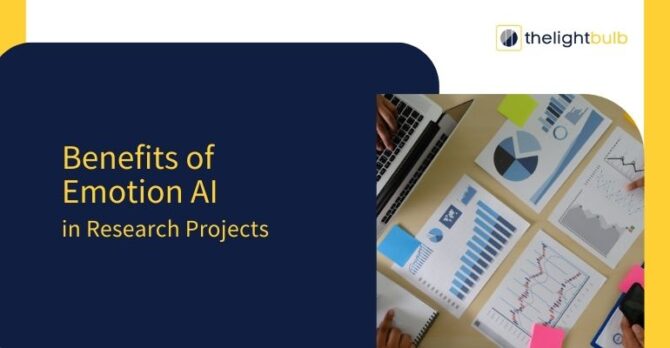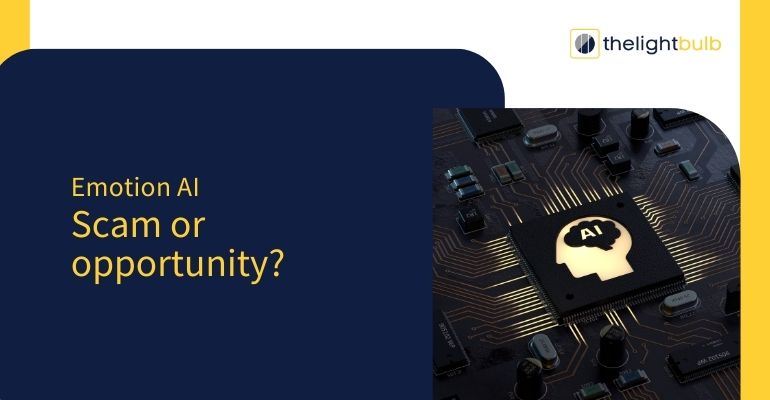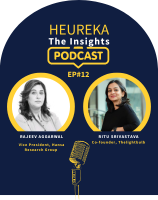
Top 3 Benefits of Including Emotion AI Tools in Your Research Project
Scientific and academic research lays the foundation for human evolution and the proliferation of structured societies across the globe. From Copernicus’s publication on the heliocentric model of the solar system in 1543 to the Darwinian theory of evolution put forth in 1859 and even the first complete genome mapping published in 1994, these historical events are a result of meticulous scientific research.
Even modern concepts like Emotion AI and Quantum Computing stem from the very roots of science and research, with the initial wireframe evolving from one research paper to another, until finally being implemented alongside existing technologies, unlocking entirely new realms of human capabilities.
Research is an indispensable tool in our scientific arsenal and new technologies like Emotion AI are poised to reform and revolutionise the current research landscape through a myriad of data processing and analytics tools. Our conversation today is entirely focused on how Emotion AI can revolutionise the field of research and the inherent benefits that come with it.
Emotion AI: The Guiding Lamp of Modern Research
Research is deeply rooted in making thoughtful observations and extracting insights based on the observations that are then verified by multiple experiments across the scientific sphere and implemented to make our lives easier.
Emotion AI can enhance the quality of insights in a research project by incorporating the emotional output of the research participants while interacting with the experimental interface.
Generic research methodologies rely heavily on subjective replies assuming sincere participation on the part of the participants, however, little effort is made to affirm this assumption. Moreover, there’s no way to account for the emotional reaction of the participants and the influence of their emotional state on their response.
Using Emotion Ai, the authenticity of their responses can be verified by unpacking their emotional profile with modern AI-based tools like FACS, eye-tracking, and audio/speech processing. Case studies, Cohort studies, Controlled Trials, and surveys are all kinds of research methodologies that involve human interaction with a scientific set-up, and with Emotion AI, the insights will be more human and therefore, the results and hence the implementations will be more human-centric.
We have already explored the Impact of Emotion AI on Market Research and this is a natural extension of that. And the benefits of using Emotion AI in Research are not confined to human-centric insights.
Here are 3 prime benefits of using Emotion AI in research projects.
1. Improved Data Collection and Analysis
Emotion AI can help researchers better understand and analyse the emotions of study participants, providing more detailed and accurate data than traditional methods of data collection and analysis. Where a conventional survey simply records responses to a set of questions physically or through a computer, Emotion AI captures the emotional insights through a recording or a live session of the participants reading the questions and responding to them.
This has two inherent benefits:
- The emotional insights can be coupled with conventional insights for a richer context.
- Personal or group bias can be easily identified by analysing the emotional profile of individuals.
Data collection and analysis for a research project are made extremely simple through a bedrock of more detailed and accurate information about the emotions of individuals through Emotion AI tools. Traditional methods of data collection and analysis, such as self-reported surveys and interviews, are limited by the subjectivity of the responses and the difficulty of accurately measuring and interpreting emotions.

On the other hand, Emotion AI uses advanced algorithms and machine learning techniques like facial coding, eye-tracking, and audio processing to automatically recognize and interpret emotions from various data sources, such as facial expressions, vocal tone, and body language. This can provide researchers with more objective and reliable information about the emotions of study participants, which can be used to understand better and analyse the data.
Additionally, the time efficiencies linked with Emotion AI-based data processing tools are highly beneficial for research projects. With high data processing capabilities and unmatched speed, Emotion AI makes it easier to identify patterns and trends in the data. This can help researchers gain richer insights in a relatively shorter span of time and produce the same results with lesser effort.
2. Richer Insights and Deeper Understanding
With Emotion AI, researchers and students can look at the detailed emotional profile of the participants and correlate that with their responses to identify any outliers or discrepancies in their responses, thereby liberating the insights of any biases or discrepancies. This helps them better understand the relationships between emotions and other factors, such as behaviour and cognition.
Interviews are one of the primary research methodologies across academic, scientific, and market research. And for the most part, interviews account for the emotional activity of the individual while recording their response. Therefore, interviews are considered to be more accurate than surveys. Emotion AI can enhance the quality of insights derived from an interview by simply recording and analysing even the small facial and eye movements accounting for the emotional signs that are too small for the human eye to catch.

AI-based tools for market research can help extract deeper insights from research data by using advanced algorithms and machine learning techniques to automatically analyse and interpret the emotions of study participants from multiple sources of data, such as facial expressions, vocal tone, and body language.
For example, by using the Facial Action Coding System (FACS), Emotion AI can recognize and interpret the specific facial muscles that are activated when a person experiences a particular emotion.
With eye-tracking and visual heatmaps, scientists and scholars can analyse the movements and patterns of a person’s eyes to determine their interest in certain questions over others and identify any mannerisms or biases to extract the purest and the most genuine insights. An attention heatmap is also indicative of sincere participation in a research study and can help researchers pick better research participants by screening them through a mock survey or interview.
Audio processing is another tool in the Emotion AI arsenal that can help analyse the tone and pitch of a person’s voice to identify emotional cues and nuances that may not be detectable through conventional methods.
3. Enhanced Efficiency and Costs Savings
Scientific and academic research is a high-cost endeavour usually funded by grants and fund pools created by societies for altruistic means. However, these pools cannot be infinitely funded and therefore researchers are forced to work on priorities rather than interest. Emotion AI can solve this by offering a cost-efficient framework for research projects.
Researchers can collect and analyse data more efficiently by employing a web-cam-based data processing tool that can capture and analyse billions of bytes of data per second, potentially reducing the time and resources needed for a research project. This will surely help reduce costs.

A practical example of this would be replacing a conventional interview with an Emotion-AI-monitored survey. Techniques like facial coding and emotion tracking can provide richer insights while at the same time, saving costs in terms of interviewer compensation.
Traditional methods of data collection and analysis, such as self-reported surveys and interviews, can be time-consuming and labour-intensive, requiring researchers to manually process and analyse large amounts of data.
Emotion AI, on the other hand, can automatically process and analyse data from multiple sources, such as facial expressions, vocal tone, and body language, to provide detailed and accurate information about the emotions of study participants. This can save researchers time and resources, and allow them to focus on more important aspects of their work like connecting the dots and making actionable observations that can be worked on by engineers.
About Lightbulb

Lightbulb.ai is an engagement analytics and emotion AI platform that provides real-time emotion AI and engagement analytics tools for real-time or remote interactions between the users and the product. Emotion AI is capable of producing smart emotional insights by using emotion-tracking tools like facial tracking, head position, audio tonality, and speech transcription. These insights are highly actionable and can help businesses craft a better user experience for their customers. It is browser-based and can be integrated with any system through in-build APIs and SDKs without any VC tools whatsoever.
You can learn more about us and how we can help you by visiting www.thelightbulb.ai, or you can book a call with us to consult UI/UX problems with our experts. Looking forward to carrying this conversation forward.











